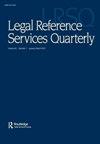从DIKW模式看法律图书馆实践——第一部分:元数据
Q4 Social Sciences
引用次数: 0
摘要
在本期中,我想继续探讨DIKW(数据-信息-知识-智慧)框架中的数据,特别强调法律图书馆员和图书馆在确保数据质量和透明度方面可以发挥的作用,以帮助解决法律研究和学术背景下的可复制性(和可再现性)问题。一如既往,这个新专栏的重点是探讨对我们的专业重要的问题,这些问题可能成为一个值得深入研究和讨论的话题。如前所述,本专栏从不假装是详尽或结论性的;相反,它的目的是建议一些主题作为起点。在2022年10月发布的一份联合声明中,来自美国9所法学院的11篇法律评论和期刊要求制定规则,要求公开已发表的实证法律研究中使用的数据和代码。联合声明是一个令人鼓舞和建设性的举措,由“对经验社会科学结果的可靠性和可复制性的关注”驱动。所有学术领域,包括科学、工程、社会和行为科学以及管理学,长期以来都在与复制问题作斗争《经济学人》2013年发表的一篇题为《科学是如何出错的》的文章引起了公众对可重复性和可重复性问题的关注本文章由计算机程序翻译,如有差异,请以英文原文为准。
Examine Law Library Practice Through the Lens of DIKW Model—Part IA: Metadata
In this issue, I would like to continue to explore data in the DIKW (data-information-knowledge-wisdom) framework with a particular emphasis on the role that law librarians and libraries can play in ensuring data quality and transparency to help redress the issue of replicability (and reproducibility1) in the context of legal research and scholarship. As always, the point of this new column is to explore issues important to our profession and that could become a worthy topic to research and discuss in more depth. As mentioned before, this column never pretends to be exhaustive or conclusive; instead, it aims to suggest a few topics as a starting point. In a joint statement released in October 2022, eleven law reviews and journals from nine US law schools asked for the creation of rules requiring the disclosure of data and code used in published empirical legal studies. The joint declaration is an encouraging and constructive move driven by “concerns regarding the reliability and replicability of empirical social scientific results.”2 All academic fields, including science, engineering, social and behavioral sciences, and management, have long struggled with the problem of replication.3 A 2013 article in The Economist titled “How Science Goes Wrong” attracted the public's attention to the issues with reproducibility and
求助全文
通过发布文献求助,成功后即可免费获取论文全文。
去求助
来源期刊

Legal Reference Services Quarterly
Social Sciences-Law
CiteScore
0.30
自引率
0.00%
发文量
13
期刊介绍:
An important forum for daily problems and issues, Legal Reference Services Quarterly will assist you in your day-to-day work as it has been helping other law librarians and members of the legal profession for over a decade. You will find articles that are serious, humorous, critical, or simply helpful to the working librarian. Annotated subject bibliographies, overviews of legal literature, reviews of commonly used tools, and the inclusion of reference problems unique to corporate law libraries, judicial libraries, and academic collections will keep you up-to-date on the continuously expanding volume of legal materials and their use in legal research.
 求助内容:
求助内容: 应助结果提醒方式:
应助结果提醒方式:


